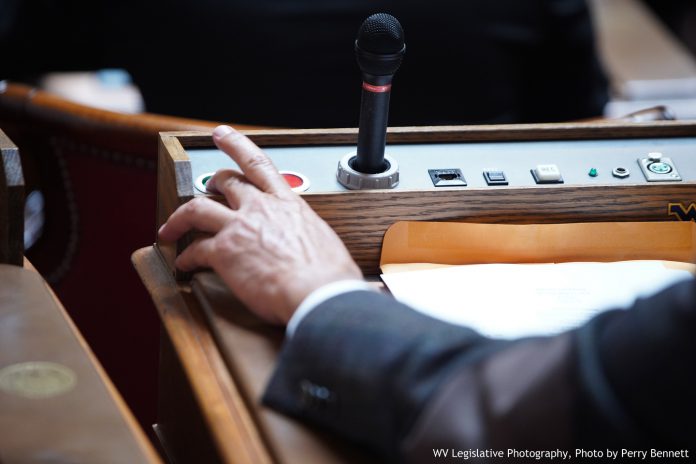As of 4 p.m., Wednesday, February 4th, 2004, the 22nd day of the 2004 Regular Legislative Session, 928 bills have been introduced in the House of Delegates. Of those, 34 measures have been passed by the House and are under consideration in the State Senate.
House Bill 4017 would prohibit the use of gambling names and symbols in advertising, signs and directions to the establishments of those who are licensed to operate video lottery machines. The measure states that a limited video lottery retailer would not be allowed to display a name for their establishment on the outside of the establishment unless the name has been approved, in writing, by the West Virginia Lottery Commission.
House Bill 4020 would protect individuals’ and their dependants’ personal information from inappropriate release. The bill states that any personal information maintained by state entities, unless essential to the function of that entity, would be exempt from disclosure.
House Bill 4021 would prevent the disclosure of a state employee’s and state officer’s personal information. The measure would provide that any personal information maintained by state agencies or entities with respect to state employees and officers, and their dependants, as well as retirees of any system administered by the Consolidated Public Retirement Board, is exempt from disclosure.
House Bill 4037 would provide for safe schools through alternative education programs, as well as provide public school officials with certain juvenile justice records. The measure would allow for disclosure of juvenile justice records if the youth has been charged with certain offenses, such as violence against others, possession of a deadly weapon and possession or delivery of a controlled substance.
House Bill 4055 would create a compact between states for the protection and return of juvenile offenders, runaways and/or other youth. The bill would authorize the Governor of West Virginia to enter an interstate agreement with other states to ensure that any juvenile, adjudicated or not, be protected while in custody and safely returned. The measure also would establish the Interstate Commission on Juveniles to collect data regarding the movement of juveniles between states and oversee the details contained in the interstate compact.
Committee Substitute for House Bill 4085 would clarify certain terms related to the Ron Yost Personal Assistance Services Act. the Ron Yost Personal Assistance Services Act (RYPAS), established in 1999, is a consumer controlled program to enable individuals with severe disabilities to live in their own homes and communities. Provisions of this bill would clarify eligibility requirements and funding sources for the program.
House Bill 4097 would identify those persons or entities responsible for paying certain fees assessed by circuit court clerks with regard to the processing of criminal bonds and bailpieces. This measure would set the fees for certain bonds and bailpieces depending on the type of bond established.
House Bill 4101 would allow an employee to use scanner technology to verify the age of a customer purchasing alcoholic beverages to use the proof of the scan as his/her defense of the sale should the purchaser prove to be under the age of 21. The bill states that any licensee, agent or employee, with the absence of fraud or bad faith, who used scanner technology to certify the age of an individual purchasing beer or alcoholic beverages, would be able to use such technology to defend the sale.
House Bill 4104 would make it a felony for the use of a scanning device or a re-encoder to commit fraudulent activities. This bill would prohibit the use of a re-encoder for the purpose of placing information from a magnetic strip of one payment card to another without the permission of the authorized user.
House Bill 4108 would exempt K-9 law enforcement and other emergency vehicles that haul animals from window-tinting requirements. The vehicles would be authorized to have sun-screening devices and darker window tinting to provide greater comfort for the animals and make them less visible from public view.
House Bill 4110 would conform the state’s criminal and penalty laws with federal law regarding the use and display of beer and alcoholic beverages in motor vehicles. The bill would provide certain regulations regarding alcohol use in public places, including highway use, and would specify vehicles in which passengers would be permitted to consume alcoholic beverages.
House Bill 4119 would allow counties that had obligated income from a hotel/motel tax to a capital project to keep the money until the obligation is paid off. Also, municipalities would be required to hold a public hearing prior to annexation, unless an election is held.
House Bill 4131 would require certain reports be made to the Legislative Oversight Commission on Workforce Investment for Economic Development. This bill would create the Workforce Initiative Program to administer and oversee grants to community and technical colleges. The program also would set criteria for grant applications, receive applications for grants, make determinations on distribution of funds, and evaluate the performance of workforce development initiatives.
House Bill 4132 relates to the West Virginia Guaranteed Work Force Program. Under this measure, the West Virginia Development Office would develop a training program to provide assistance for new or expanding businesses for training, retaining, or upgrading of the skills of potential employees. The program would emphasize training of employees specifically designed to accommodate the needs of individual employers.
House Bill 4157 would continue the Rural Health Advisory Panel. This panel is designed to increase the amount of healthcare services provided in rural areas of the state, and works in conjunction with the Rural Health Education Partnership to attract healthcare professionals to rural West Virginia.
House Bill 4248 would continue the Office of the Environmental Advocate. The Environmental Advocates Office handles requests for assistance about the public comment process, how to appeal agency decisions, and other useful resources.

